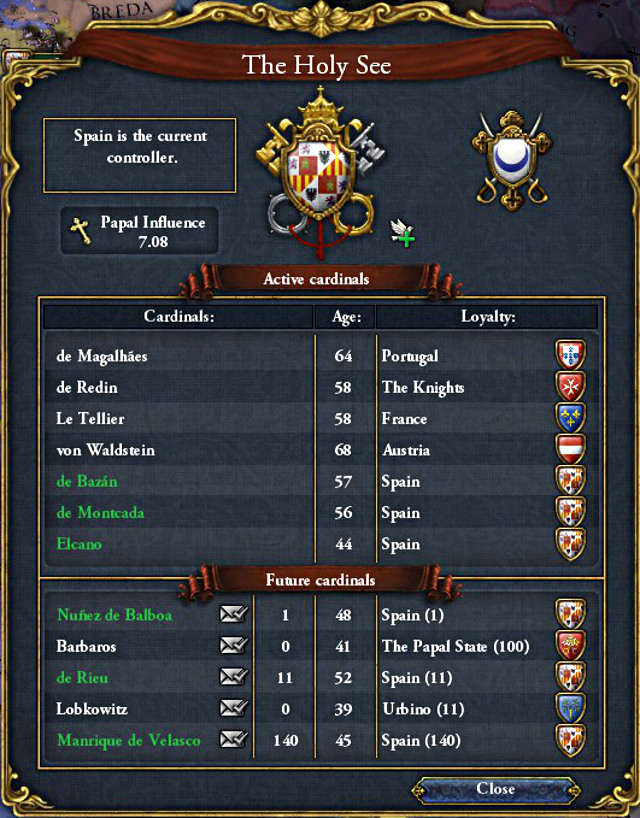Europa Universalis 4: The Holy See

The Catholic countries can enter the control of the Curia. Controlling the Curia has a positive effect on the country and, furthermore, provides access to unique diplomatic options.
The Curia consists of seven Cardinals. The country to control most of the priests of this group, takes control over the Papacy, which automatically provides him with the following effects:
- Stability Cost -5%
- Available Diplomats +1
- Yearly Prestige+1
- Possible Advisors +2
- Yearly papal influence +2
- Leaders without Upkeep +1
Controlling the Curia also gives access to two unique diplomatic options:
Call for Crusade - You can all a Crusade against heretics. Each Catholic country will receive a special Casus Belli for the Holy War against a chosen target. The crusade lasts one year and there can be only one active at any given time. Each country that responds to the call, will receive the following bonuses: Tax Modifier +10%, Morale +0,50, manpower modifier +30%, prestige +1, papal influence +2.
Excommunicate - Excommunication will allow you to attack a Catholic country without losing your stability for the lack of Casus Belli. It is possible only if the relations of that country with the Rome are low.
Furthermore, even if you do not control the Curia, you receive the following bonus for each Cardinal that you control:
- Yearly Prestige+0,20
- Yearly Papal influence +0,20
- Yearly Legitimacy +0,5
- Technology cost -1%
There is a number of advantages and useful options to the Papacy so, it is not a good idea to ignore it, and you should attempt to control it, to the extent that it is possible. Crusades are especially useful when, e.g. you play an European country bordering with Turkey, whereas the Excommunication is a good way to weaken a strong country, by drawing it into a series of wars without moving your armies. Unfortunately, the control over the Curia is a thing that is quite complicated and random, to a large extent. The entire Curia is divided into 12 Cardinals - 7 main and 5 candidates, of which the oldest one will take place among the 7 in the case of death of one of them. A Cardinal once hosen will be a supporter for one country until his death and this cannot be changed in any way. You can still change the support of the candidates. For that, you spend the so called, Papal Influence. The growth of Papal influence is dependent on prestige, taxes, the number of erected temples, religious unity, your relations with the Holy See, and on various decisions taken by you and the number of Cardinals that you control. By spending your Papal Influence points, you talk the candidate into loyalty and, once he is elected, he will be loyal to your cause until his death. Of course, the other countries may also spend their Papal Influence points to persuade candidates and, which is most important - a candidate can never become a Cardinal and die before being elected. This matter decides about the random nature and unpredictability while striving for power over the Curia. The lifespan of a Cardinal is around 72 years but this number is variable and it may be much longer or much shorter. The best strategy is to fight for support of the youngest candidates from the very first years of candidacy but you will have to wait a decade or two for the actual effects to take place. Also, do not let yourself be pulled into a senseless fight over the support of one Cardinal. If there is a country bent on outbidding you, instead of wasting all your Papal Influence on one candidate, spread it over two or three others. The fight for the domination of the papacy will be much easier after Reformation takes place, when a lot of countries will leave the Rome's umbrella.
You are not permitted to copy any image, text or info from this page. This site is not associated with and/or endorsed by the developers and the publishers. All logos and images are copyrighted by their respective owners.
Copyright © 2000 - 2026 Webedia Polska SA for gamepressure.com, unofficial game guides, walkthroughs, secrets, game tips, maps & strategies for top games.
